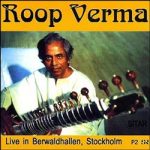
Price: $20.00
Audio Preview:
An extraordinary performance in one of the most prestigious halls of Northern Europe, simultaneously broadcast by Swedish National Radio. With exquisite accompaniment by Subhash Sarkar on tabla and Wini Hald on tamboura, this recording is a musical treat for your heart and soul. It is best suited for evening listening.
Mats Einarsson, producer at the Swedish Broadcasting Corporation, met Roop Verma one cold October day in 1997 in Gothenburg. During their conversation they discussed the deeper aspects of the Indian raga, an ancient music with its roots in religious traditions. Roop emphasized that the function of music in the old temples was to create an inner peace. For example, the tamboura plays a very important part. With its never-ending flow of the same tone, it creates a horizontal line through the music, a syllable of sound, as Roop says, which brings your mind into focus and relaxation.
Portions of their conversation follow:
M. E. Classical North Indian music, music from a different culture and time, with roots in religious customs. Doesn’t one need a lot of knowledge about the Indian raga to be able to enjoy this music?
R. V. Not at all. If I have never been to the ocean, and for the first time you invite me there, there is no need to explain what it’s like. You don’t need to explain what a relaxed state of being it will be there. I just lie down on the sand and enjoy. We should approach music in the same way.
M. E. Should I really listen to it, or should I just feel the music?
R. V. Both are necessary. You pay some attention to the tuning and how the music is unfolding, to the different segments of music. But this is a very small part. This music, being an experiential music, must be experienced. It has to be felt. Because, as long as we are engrossed or confined to the structure, we miss the soul. The soul of music is behind the structure. So when we let the music flow by itself and just penetrate the whole body, so to speak, that’s the time the mind starts to pay less attention to the structure and the experience reaches the highest level by itself.
During later years, many of Roop’s concerts have been followed by Nada Yoga seminars. Nada Yoga is an old tradition with its origin in the temples.
R. V. The word nada comes from the Sanskrit word nad, which means to flow. So the sound, that continuity of the flow, is the key point here. The sound is used to create that sustained effect on the mind.
Produced in Sweden by Prova Productions.
1. Raga Mishra Kirwani Inner Search
2. Raga Manjh Khamaj Love and longing, union and joy
3. Dhun Salute to Life
4. Dhun Celebration